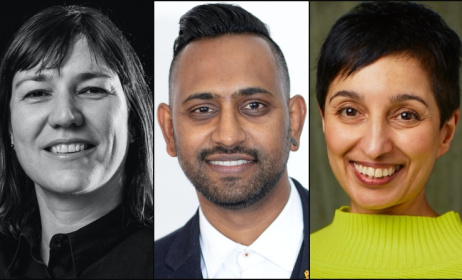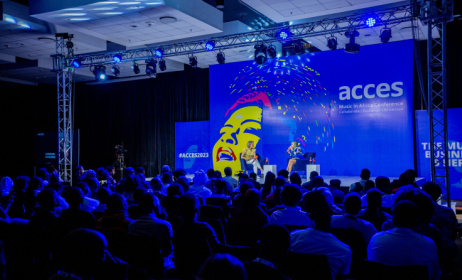Making money from music commissions in South Africa
The process of accepting a fee in exchange for composing a new piece of music is known as a music commission. This is a broad term that covers a wide range of possibilities, from being contracted to write music for a movie or TV show to writing a commissioned piece for an orchestra or theatrical production.[1]
This article focuses on the potential of music commissions as a revenue stream for South African musicians.
What it takes to write commissioned music
Writing for music commissions has become more alluring to composers, especially in the context of the declining value of the South African recording industry. As will be discussed in detail below, composing for music commissions happens within the framework of the vision of the director and the needs of the audience. Although copyright and rights collection processes operate in much the same way,[2] one important distinction is that more productivity is generally demanded of an author who composes for film, television and/or advertisements. While a songwriter may do one album per year of 15 songs, a single music commission job could entail anything from five to 50 works, occuring three or four times per year, totalling 100 or more individual compositions per year.[3]
Brendan Jury is one of South Africa’s leading composers for film and television. He began his musical career with the band Urban Creep, which had three No 1 radio hits in the 1990s. Brendan was always driven towards more empowering solutions in his music career, and so he sought to build a mechanism that would give him the means of owning his own musical process – from production to recording and release. Via Shifty Records, he teamed up with Warwick Sony and they started composing music for commercials and television, and were commissioned to do the soundtrack for Jane Taylor’s play, Ubu and the Truth Commission, under the directorship of William Kentridge.[4]
“Some editors and directors believe that sound is half of the experience,” Jury expplains. “When as a composer you're composing for a television drama or film, your job is extremely important. It can make or break a scene. Composing for TV and film is a great skill journey to go on because it's very difficult and multilayered. You really have to immerse yourself in drama and storytelling and really be cognisant of the genres and what works.”[5]
Video: SA musician Brendan Jury discusses the role of the composer in the filmmaking process.
Creative framework
The famous Hollywood composer Hans Zimmer once said, “The most important thing for a composer is working out who their boss is.”[6]
Essentially, the composer is providing a service, and in today’s market this is usually to serve the artistic vision of media companies and production houses. In this fast-paced environment, composers need to be flexible and adaptable to meet the changing needs of the media market. As Jury says, “Media is becoming the most important cultural definition. Media is where culture is really defining its identity as an ever-evolving community process.”[7]
If you love composing music, then the best way to get into the music commissions market, according to Jury, is to jump right in and start creating content. “You empower yourself as you become a content creator,” he says. Initially, he suggests building a portfolio by working on other people’s projects, such as composing music for their YouTube content streams.
Jury suggests the following basic requirements for those starting out:[8]
- Digital audio workstations (DAWs) like Pro Tools and Logic Pro are necessary tools, as these are the industry standards for all final mix studios.
- Online learning resources provide training for all skill levels and are essential platforms for keeping up-to-date with emerging technologies and cutting-edge techniques.
- Composers can also learn about making music for media through outcome-based colleges offering specialised courses.
Music commission payment structures
Jury’s most recent soundtrack commission was for the South African-made Netflix film I Am All Girls. According to him, when working with TV studios and production houses, especially with those based overseas, the composer is typically exposed to a front-end buyout payment model. In this deal, the composer sells the synchronisation and mechanical rights to the publisher for a flat fee. This arrangement has, generally, worked out as a good business model for both parties. For the composer, it is often too difficult to know how often a piece of content is viewed on a streaming platform, and so a flat fee often makes sense. Meanwhile, publishers have seen returns of 2:1 and even 4:1 on their buyout investments over periods of four to eight years.[9]
The composer will also potentially receive performance royalties from their commissions – provided that their music is registered with the appropriate collection agencies. Local TV channels like M-Net and SABC, as well as international stations such as the BBC and NBC, all have agreements in place with South African CMOs to pay these royalties.[10]
According to the Revenue Streams for Music Creators in South Africa 2022 report, music commissions, in the form of payments for features, brought in an average monthly income of R7 324.
Video: On music commissions such as international soundtracks, a buyout payment structure is usually used.
Opportunities for South African music creators
In South Africa, television has emerged as the leading terrain for cultural exploration. Channels such as Mzansi Magic on DStv are actively supporting brave new works, and the local film industry is growing, with a number of exciting new filmmakers and emerging production houses making popular new content in a variety of formats and genres.
Yet, these gains threaten to be offset by a general decline in advertising budgets and a subsequent reliance – on the part of TV studios and production houses – on generic library music. Today, music library publishing is a $2 billion a year industry, with relatively cheap ‘blanket licences’, which provide access to extensive music catalogues, dominating the market. This has created a situation where it can be difficult for new voices to break into the film music composition market.[11]
Jury’s solution to this problem is to offer his clients a “bespoke music library”, where the music he composes is tailor-made for the specific production and that director's vision. It is a complete service, allowing the director to utilise the music as they see fit. The compositions are detailed and correctly tagged with metadata, so that no matter where the music plays, it will register with the appropriate collective management organisations (CMOs) around the world.[12]
Final thoughts
Although the process of finding music commissions can be daunting, there are opportunities and pathways available to hardworking South African composers who have a special gift for working in different genres and tuning into the needs of different artistic projects. If the local film and television industries remain on their promising growth trajectories, music commissions will become an increasingly attractive revenue stream for South African composers.
Resources and citations
- [1] Small, M. (2018). Commissioning Music: A Basic Guide. Accessed on January 4, 2022: http://www.mattsmall.org/CommBasicGuide04.pdf
- [2] Government of South Africa. (1978). Copyright Act. Accessed on January 4, 2022: https://www.gov.za/sites/default/files/gcis_document/201504/act-98-1978.pdf
- [3] Original interview for Music In Africa with Brendan Jury: November 20, 2021.
- [4] Ibid.
- [5] Ibid.
- [6] Price, A. (2018). “Hans Zimmer Interview - The Art of Film Scoring”. Music Tech. Accessed on January 4, 2022: https://musictech.com/features/hans-zimmer-interview/
- [7] Interview with Brendan Jury. Ibid.
- [8] Ibid.
- [9] Lawyer Drummer. (2014). “The 3 Types of Music Publishing Agreements (and why they’re important)”. Accessed on January 4, 2022: https://lawyerdrummer.com/2014/04/music-publishing-agreements/
- [10] CAPASSO. (2021). “Music licensing”. Accessed on January 4, 2022: https://www.capasso.co.za/music-licensing/
- [11] Parisi, P. (2018). “Production Music Is a Billion-Dollar Business”. Variety. Accessed on January 4, 2022: https://variety.com/2017/biz/news/production-music-billion-dollar-business-study-1202563223/
- [12] Interview with Brendan Jury. Ibid.
This article is part of the Revenue Streams for African Musicians project, supported by UNESCO’s International Fund for Cultural Diversity in the framework of the UNESCO 2005 Convention on the Protection and Promotion of the Diversity of Cultural Expressions, the Siemens Cents4Sense programme, Siemens Stiftung, Goethe-Institut, the National Arts Council of South Africa and Kaya FM.
Editing by David Cornwell and Kalin Pashaliev

























Commentaires
s'identifier or register to post comments